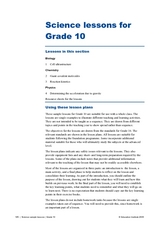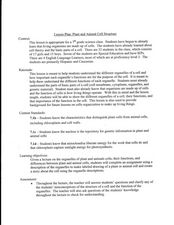Curated OER
Practice Worksheets: Parts of the Eye
In this biology worksheet, students label the different parts of the eye in the diagram. They answer 3 questions by matching the eye parts and their functions.
Curated OER
Human Blood: Microviewer
In this human blood: microviewer instructional activity, learners answer questions about blood, red blood cells, white blood cells, phagocytosis, blood type B, fibrin, sickle cells, and infected blood. Students also draw quick sketches...
Curated OER
Microviewer
In this microviewer worksheet, students observe several types of cells. Students draw each type of cell and label the important parts. Students also answer questions relatable to the cell and the purpose for study.
Curated OER
Let's Get Organized
Sixth graders identify table and each of its parts, including cell, column, row, header, and formula bar. Students then explain how tables are used to store and organize information in database, organize and categorize information...
Curated OER
Standard 4 Review Sheet-Key Ideas Biology-The Living Environment
In this living environment worksheet, students answer a variety of questions about living organisms, the processes they go through to make food and break down food, absorb nutrients, and release toxins. They explain homeostasis, they...
Curated OER
Science Lessons for Grade 10
Tenth graders identify the parts and functions of the cell. In this series of science lessons, 10th graders investigate crystal formation in covalent compounds. They investigate the factors affecting reaction rates.
Curated OER
The Battle of the Guts
Young scholars listen to story, The Magic School Bus: Inside Ralphie, take notes from story on how body fights germs, identify different functions of immune system, and use Kid Pix slide show to explain how body fights viruses and bacteria.
Curated OER
Getting Up the Nerve
Students examine the basics of the nervous system through an interactive program. They discover how the brain is linked to muscle movement. They can test cells through the interactive program to see how it reacts to different stimuli.
Curated OER
Plant Cells and Tissues
In this plants worksheet, students review 17 vocabulary words associated with the different types of plant cells and tissues. This worksheet has 17 matching questions.
Curated OER
Population Models and Qualitative Analysis, Part 2
For this population model worksheet, students explore models of population growth using the Gompertz growth model and the exponential growth model. They sketch a graph of the slope function and determine possible solutions over time....
America's Blood Centers
My Blood, Your Blood
Dracula isn't the only one who needs blood to survive. The eight-part unit includes seven lessons, five demonstrations, seven labs, and a project to organize a blood drive. Class members learn about the parts of blood, the form and...
University of Minnesota
Connect the Neurons!
Create a neuron frenzy as your pupils play the part of the neurons. An engaging lesson creates a human chain of neurons that pass cotton balls posing as neurotransmitters. Scholars learn about pre- and post-synapses as they complete the...
K12 Reader
Tissues, Organs and Systems
Young scientists are introduced to the connections among cells, tissues, organs, and systems in a life science reading comprehension learning exercise that asks them to respond to a series of questions based on the passage.
Serendip
Introduction to Osmosis
A chicken egg is a very large cell—perfect for investigating osmosis! Scholars conduct an experiment with vinegar and eggs that helps them understand the process of osmosis. They follow the activity with an in-depth look at osmosis in...
LABScI
Botany: The Plant Dissection Lab
Study everything about plants! The 12-part series of lessons continues with an examination of many aspects of plants. Components of the laboratory activity address the growth and structure of plants by evaluating familiar plants. The...
Howard Hughes Medical Institute
Viral DNA Integration
How do reverse transcriptase inhibitors work? Young virologists examine the function of azidothymidine, a drug doctors use to treat HIV patients, during a hands-on modeling activity. Groups create a strand of DNA from an HIV RNA strand...
Curated OER
Control of the Cell Cycle
In this cell cycle worksheet, students review how enzymes control the cell cycle and what happens when the cell cycle becomes uncontrolled. This worksheet has 7 short answer questions.
Curated OER
Cell Works
Students identify the different parts of the cells and their functions. In this biology instructional activity, students create an analogy of a cell and its organelles. They make a poster and present it to class.
Curated OER
The Cell Theory
In this cells worksheet, students review how the cell theory was developed. Students review the structure and function of cell structures and active transport. This worksheet has 30 fill in the blank questions.
Curated OER
Drawing a Plant Cell
In this cell structures worksheet, students draw a plant cell. Students draw and label all of the parts listed in the word bank. Students then identify each part by coloring it the color indicated in the word box.
Curated OER
Plant And Animal Cells
Students identify parts of plant and animal cells and describe the functions of each part. They distinguish between plant and animal cells. After a lecture/demo, students perform experiments which help them construct models of plant and...
Curated OER
Plant and Animal Cell Structure
Seventh graders identify the different parts and functions of the cell. In this biology lesson, 7th graders make a labelled diagram of either a plant or animal cell. They write a story about it.
Curated OER
Cell Structure and DNA
Sixth graders identify, locate and describe the function of the parts of a cell. In groups, they state the five stages of mitosis and put them in the correct order. They are introduced to the structure of DNA and mRNA and how they...

























